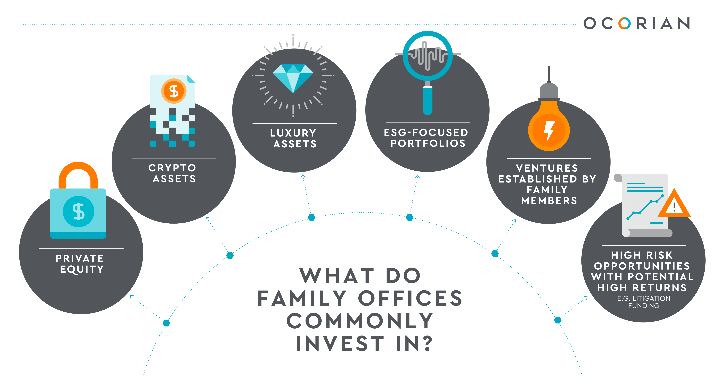Executive Director, Richard Joynt reflects on how the prolonged period of economic turbulence has affected the portfolio allocations of family offices as they try to preserve and grow their family's wealth.
In my experience, a family office manages its asset base based on knowledge and experience, and taking a risk-based approach to concentration risk. This can sometimes be in direct contrast to the methodology used by external managers - which is to diversify and avoid concentration risk! The one theme that also stands out is that family offices want to invest in something that can provide above-average returns, which drives the types of asset classes that are becoming more and more prominent - see below.

Private equity
Private equity has therefore become a major theme for many family offices. According to data from UBS and Campden Research's The Global Family Office Report 2019, family office investments in private equity heralded a significant average return of between 8.6% and 16%1 . The same report also revealed that allocations to private equity continue to climb, accounting for 20% of the average family office portfolio globally (of which between 79%-88% exceeded performance expectations) . This allocation can take the form of private equity fund investments or indeed, direct investments. The case study below demonstrates that when the family offices and investee company work in partnership, the outcome can be enhanced returns for all.
Case study
Our client
A family office client of Ocorian invested in a start-up technology business, backing an existing management team who had created a valuable business unit within a large listed firm.
Challenge
The management team had the industry contacts and credibility to establish a new operation, and had already worked together exceptionally well as a team. However, in their previous firm they had relied on their finance function for all structuring, tax and financial planning considerations.
Our solution
The family office team therefore designed the group structure (building in tax neutrality), decided on the residence location of the company based on various practical factors, and sought specific favourable VAT rulings. The family office team then designed the financial control mechanisms, including foreign exchange risk mitigants, and performed all derivative financial trading to support the business' cash needs.
Results
In a four year period, the business grew rapidly and was sold for 17x original investment, a stellar result for management and family office alike.
This case study demonstrates that family offices can add real value to an investment outcome, bringing their expertise and knowledge to bear to assist management teams where possible. Because family offices are bespoke and are usually staffed with experts in their fields, they can be a better investment partner than a regulated investment house.
Cryptocurrencies
As the digital era becomes more deep-rooted, digital financial assets are becoming more popular. Although still viewed as high risk, these assets have the capability to produce high multiple returns. Those family office investors who are tracking this class of asset have normally done their homework and fully understand technology behind the investment.
Luxury assets
This asset class divides opinion. Luxury assets such as aircraft and motor vessels do tend to have very high running costs, even when not in use. This can cause some clients to see them as cost centres rather than assets.
However, we have seen some client families create financial returns from such assets, either through capital gains as a result of timely purchase and sale of the assets through bear and bull cycles, or through charter arrangements. However, it should be noted that in many of these asset classes, there has been a long-term excess of supply over demand since 2008. This has resulted in a prolonged bear cycle for many luxury assets, particularly at the low and medium end of the market.
Niche asset classes
We have also seen an increasing amount of family office clients adopt an impact investing ethos. This has seen them invest in infrastructure and ESG funds - there is often a "next gen" involvement in these assets as the consensus is that these will be the more attractive assets of the future (although this is leading to some level of overvaluation as interest in a relatively small universe of stocks increases).
Download our Guide to Family Offices
With each family office set up to meet the demands of a specific client family, there is no blueprint for how an effective family office should operate. In response to this need for clarity, we have produced A Guide to Family Offices. Download it here.
Footnote
1 UBS & Campden Wealth: Global Family Office Report 2019
The content of this article is intended to provide a general guide to the subject matter. Specialist advice should be sought about your specific circumstances.
